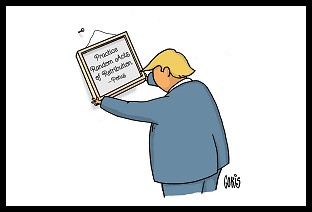 Erik Kirschbaum of the Los Angeles Times appears to be deeply troubled. According to last May's official count, Austria Green Party presidential candidate Alexander van der Bellen defeated Norbert Hofer of Austria's far-right "Freedom Party" by 30,863 votes. Now, as the result of what Kirschbaum describes as "irregularities in the counting of absentee ballots," Austria's Constitutional Court has ordered a second, nationwide election for the largely ceremonial post.
Erik Kirschbaum of the Los Angeles Times appears to be deeply troubled. According to last May's official count, Austria Green Party presidential candidate Alexander van der Bellen defeated Norbert Hofer of Austria's far-right "Freedom Party" by 30,863 votes. Now, as the result of what Kirschbaum describes as "irregularities in the counting of absentee ballots," Austria's Constitutional Court has ordered a second, nationwide election for the largely ceremonial post.
From a political perspective, Kirshbaum's concerns are understandable. After all, we are talking about providing a second opportunity for a presidential candidate whose "Freedom Party" was founded by former Nazis. But, as Brad Friedman has so frequently urged, election integrity is not about Left or Right. It's about right and wrong.
In that light, the July 1, 2016 decision issued by Austria's Constitutional Court represents a major victory for election integrity --- one that elevates what it describes as the fundamental prerequisite of ensuring "transparency in the establishment of the electoral result."
The court ruled that two individuals in each election district --- a chief and an assistant election officer --- must be personally present during the opening and counting of all mail-in ballots. Anything less opens up the prospect of a manipulated count.
Significantly, the party challenging the electoral result does not have to prove a manipulation of the result. If it was possible to manipulate enough ballots to alter the outcome, the official results must be set aside and a new election scheduled.
If applied by the U.S., the reasoning adopted by Austria's Constitutional Court would produce a fundamental and beneficial change in how our own elections are conducted...
Some but not all VBM deficiencies addressed
In his brief 2008 article, "Why 'Vote-By-Mail' Elections are a Terrible Idea for Democracy", after acknowledging the total lack of transparency in touch-screen voting, Brad Friedman observed:
It is also much harder to track such ballots. Unlike ballots cast at the polls, where sign-in rosters can be compared to the number of ballots counted, it's far more difficult to match up such numbers after ballots are dropped into the black hole that is the U.S. Postal System.
While Austria's Constitutional Court left open the possibility that postal voting, of itself, did not violate that nation's constitutional mandate for transparency, the court's own mandate for strict adherence to mail-in vote-counting procedures addressed many of Friedman's valid concerns.
Like Germany's highest court, which in 2009 declared that all forms of e-voting are unconstitutional because there is no way to "observe" whether the reported result is accurate, Austria's Constitutional Court eliminated Friedman's concerns about the lack of transparency in the counting of mailed-in ballots by easily manipulated optical systems. Two Austrian election officials --- a district chief election officer and an assistant --- must be present to personally observe "the 'slitting open' of postal ballot" and to personally take part in the counting of those ballots. Anything less than that would prevent the "electoral authority," operating "as a collegiate body" from independently authenticating the ballots to be counted or the accuracy of the count.
Challenger need not prove illicit manipulation
Per Austria's Constitutional Court, the question as to whether someone illicitly manipulated the result "is of no relevance." All that a challenger need show is that the number of votes in which election officials failed to adhere to that nation's strict procedures is high enough that it may have altered the outcome. While, according to the official count, Van der Bellen defeated Hofer by 30,863 votes, the "infringements concern a total of 77,926 postal votes," the court noted. Hence, the need to conduct a new election between the two candidates.
The potential for manipulation of the count exists with respect to all e-voting systems --- optical scan systems, 100% unverifiable touch-screens and, perhaps especially, Internet voting. The number of U.S. elections that could be overturned if our own courts applied the "possible manipulation" standard are, thus, far too many to enumerate. One immediately comes to mind --- the 2010 South Carolina Democratic U.S. Senate Primary contest between Alvin Greene and Vic Rawl. With the exception of absentee ballots, that "election" was conducted on 100% unverifiable ES&S iVotronic touch-screen Direct Recording Electronic (DRE) machines.
As we reported at the time:
The numbers were beyond absurd. Lancaster County paper absentee ballots went to Rawl 84% to 16%. The unverifiable touch-screens in the same county, however, said Rawl lost it by 17%. Greene received more votes than were cast in 25 Spartanburg County precincts. The votes of 50 other precincts were missing from the final count. Statewide, the virtually unknown Greene somehow managed to capture 60% of the vote, according to the iVotronic DREs.
Denied access to the iVotronic memory cartridges, source codes, and machines, Rawl nonetheless presented an impressive five-hour case to the state Democratic Party Executive Board in contesting the race. Two computer scientists testified that system malfunction provided the only reasonable explanation. Voters said they saw their votes flipped to Greene. Campaign workers saw poll workers swapping out memory cartridges during the election.
Rawl’s challenge of the machines was ignored by most of the mainstream media and summarily rejected by the Democratic Party's Executive Board, largely for what has been described to The BRAD BLOG by insider sources as "political reasons".
Under the standards imposed by both Germany's and Austria's courts, neither "political reasons" nor Rawl's lack of access to the memory cartridges would have allowed the seemingly absurd result to stand. The appropriate recourse would have entailed a second election that complied with "Democracy's Gold Standard" --- hand-marked paper ballots publicly hand-counted at each precinct on Election Night. That would have ensured what the Austria Constitutional Court described as "transparency in the establishment of the electoral result."
Ernest A. Canning is a retired attorney, author, Vietnam Veteran (4th Infantry, Central Highlands 1968) and a Senior Advisor to Veterans For Bernie. He has been a member of the California state bar since 1977. In addition to a juris doctor, he has received both undergraduate and graduate degrees in political science. Follow him on twitter: @cann4ing


 Sunday 'Random Acts of' Toons
Sunday 'Random Acts of' Toons From CA's 'Nuclear Deterrence' Map to Newsom's Trolling to Trump's 'Fascist Theatre' and Beyond: 'BradCast' 8/21/25
From CA's 'Nuclear Deterrence' Map to Newsom's Trolling to Trump's 'Fascist Theatre' and Beyond: 'BradCast' 8/21/25 'Green News Report' 8/21/25
'Green News Report' 8/21/25
 On 'Americanism' and Trump's 'Stalinesque' Plot to Whitewash U.S. History: 'BradCast' 8/20/25
On 'Americanism' and Trump's 'Stalinesque' Plot to Whitewash U.S. History: 'BradCast' 8/20/25  Texas GOP Imprisons Dem State Lawmaker in State House Chamber: 'BradCast' 8/19/25
Texas GOP Imprisons Dem State Lawmaker in State House Chamber: 'BradCast' 8/19/25 'Green News Report' 8/19/25
'Green News Report' 8/19/25 Trump, Nazis and
Trump, Nazis and  Sunday '
Sunday ' Newsom's 'Election Rigging Response Act'; FCC's License Renewal for Sock-Puppeting Sinclair: 'BradCast' 8/14/25
Newsom's 'Election Rigging Response Act'; FCC's License Renewal for Sock-Puppeting Sinclair: 'BradCast' 8/14/25 'Green News Report' 8/14/25
'Green News Report' 8/14/25 140 New House Reps?: Moving Beyond the Gerrymandering Wars: 'BradCast' 8/13/25
140 New House Reps?: Moving Beyond the Gerrymandering Wars: 'BradCast' 8/13/25 FCC Renews Sinclair TV Licenses Despite Complaint from Petitioner Who Died Waiting
FCC Renews Sinclair TV Licenses Despite Complaint from Petitioner Who Died Waiting It's Not About the Rule of Law, It's About Authoritarian Control: 'BradCast' 8/12/25
It's Not About the Rule of Law, It's About Authoritarian Control: 'BradCast' 8/12/25 'Green News Report' 8/12/25
'Green News Report' 8/12/25 After Vaccine Cancels, CDC Shooting, Former Officials Want RFK Out: 'BradCast' 8/11/25
After Vaccine Cancels, CDC Shooting, Former Officials Want RFK Out: 'BradCast' 8/11/25 Sunday 'All's Well' Toons
Sunday 'All's Well' Toons 'Green News Report' 8/7/25
'Green News Report' 8/7/25 Trump Wars Against Greem Energy, Democracy on VRA's 60th: 'BradCast' 8/7
Trump Wars Against Greem Energy, Democracy on VRA's 60th: 'BradCast' 8/7 Media Conglomerates Continue Trump Capitulation: 'BradCast' 8/6/25
Media Conglomerates Continue Trump Capitulation: 'BradCast' 8/6/25 Banana Republican: Trump Shoots the Labor Statistics Messenger: 'BradCast' 8/5/25
Banana Republican: Trump Shoots the Labor Statistics Messenger: 'BradCast' 8/5/25 All's Fair in Love, War and, Apparently, Part-isan Gerrymandering: 'BradCast' 8/4/25
All's Fair in Love, War and, Apparently, Part-isan Gerrymandering: 'BradCast' 8/4/25 The Art of the Corrupt, Phony, Unlawful, Pretend Trade Deal: 'BradCast' 7/31/25
The Art of the Corrupt, Phony, Unlawful, Pretend Trade Deal: 'BradCast' 7/31/25 Battle Begins Against Trump EPA Climate Regulations 'Kill Shot': 'BradCast' 7/30/25
Battle Begins Against Trump EPA Climate Regulations 'Kill Shot': 'BradCast' 7/30/25 A Pu Pu Platter of Trump Corruption: 'BradCast' 7/29/25
A Pu Pu Platter of Trump Corruption: 'BradCast' 7/29/25 'Catastrophic' GOP Cuts to Medicaid, Medicare, ACA: 'BradCast' 7/28/25
'Catastrophic' GOP Cuts to Medicaid, Medicare, ACA: 'BradCast' 7/28/25
 VA GOP VOTER REG FRAUDSTER OFF HOOK
VA GOP VOTER REG FRAUDSTER OFF HOOK Criminal GOP Voter Registration Fraud Probe Expanding in VA
Criminal GOP Voter Registration Fraud Probe Expanding in VA DOJ PROBE SOUGHT AFTER VA ARREST
DOJ PROBE SOUGHT AFTER VA ARREST Arrest in VA: GOP Voter Reg Scandal Widens
Arrest in VA: GOP Voter Reg Scandal Widens ALL TOGETHER: ROVE, SPROUL, KOCHS, RNC
ALL TOGETHER: ROVE, SPROUL, KOCHS, RNC LATimes: RNC's 'Fired' Sproul Working for Repubs in 'as Many as 30 States'
LATimes: RNC's 'Fired' Sproul Working for Repubs in 'as Many as 30 States' 'Fired' Sproul Group 'Cloned', Still Working for Republicans in At Least 10 States
'Fired' Sproul Group 'Cloned', Still Working for Republicans in At Least 10 States FINALLY: FOX ON GOP REG FRAUD SCANDAL
FINALLY: FOX ON GOP REG FRAUD SCANDAL COLORADO FOLLOWS FLORIDA WITH GOP CRIMINAL INVESTIGATION
COLORADO FOLLOWS FLORIDA WITH GOP CRIMINAL INVESTIGATION CRIMINAL PROBE LAUNCHED INTO GOP VOTER REGISTRATION FRAUD SCANDAL IN FL
CRIMINAL PROBE LAUNCHED INTO GOP VOTER REGISTRATION FRAUD SCANDAL IN FL Brad Breaks PA Photo ID & GOP Registration Fraud Scandal News on Hartmann TV
Brad Breaks PA Photo ID & GOP Registration Fraud Scandal News on Hartmann TV  CAUGHT ON TAPE: COORDINATED NATIONWIDE GOP VOTER REG SCAM
CAUGHT ON TAPE: COORDINATED NATIONWIDE GOP VOTER REG SCAM CRIMINAL ELECTION FRAUD COMPLAINT FILED AGAINST GOP 'FRAUD' FIRM
CRIMINAL ELECTION FRAUD COMPLAINT FILED AGAINST GOP 'FRAUD' FIRM RICK SCOTT GETS ROLLED IN GOP REGISTRATION FRAUD SCANDAL
RICK SCOTT GETS ROLLED IN GOP REGISTRATION FRAUD SCANDAL VIDEO: Brad Breaks GOP Reg Fraud Scandal on Hartmann TV
VIDEO: Brad Breaks GOP Reg Fraud Scandal on Hartmann TV RNC FIRES NATIONAL VOTER REGISTRATION FIRM FOR FRAUD
RNC FIRES NATIONAL VOTER REGISTRATION FIRM FOR FRAUD EXCLUSIVE: Intvw w/ FL Official Who First Discovered GOP Reg Fraud
EXCLUSIVE: Intvw w/ FL Official Who First Discovered GOP Reg Fraud GOP REGISTRATION FRAUD FOUND IN FL
GOP REGISTRATION FRAUD FOUND IN FL

































